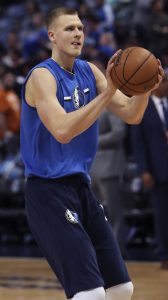The NBA’s rookie scale, which determines how much first-round picks earn during their first four NBA seasons, also dictates how much the qualifying offers will be worth for those players when they reach restricted free agency after year four. However, the value of those qualifying offers can fluctuate depending on whether or not a player has met the “starter criteria.”
Here’s how the starter criteria works:
A player who is eligible for restricted free agency is considered to have met the starter criteria if he plays at least 2,000 minutes or starts 41 games in the season before he reaches free agency.
A player can also meet the criteria if he averages either of those marks in the two seasons prior to his restricted free agency. For instance, if a player started 50 games in 2016/17 and 32 in 2017/18, he’d meet the starter criteria, since his average number of starts over the last two seasons is 41.
A player’s ability or inability to meet the starter criteria can affect the value of the qualifying offer he receives as a restricted free agent, as follows:
- A top-14 pick who does not meet the starter criteria will receive a qualifying offer equal to the amount the 15th overall pick would receive if he signed for 120% of the rookie scale.
- A player picked between 10th and 30th who meets the criteria will receive a qualifying offer equal to the amount the ninth overall pick would receive if he signed for 120% of the rookie scale.
- A second-round pick or undrafted player who meets the criteria will receive a qualifying offer equal to the amount the 21st overall pick would receive if he signed for 100% of the rookie scale.
- For all other RFAs, the standard criteria determine the amounts of their qualifying offers.
Extending a qualifying offer to a player eligible for restricted free agency officially makes that player an RFA, ensuring that his team has the right of first refusal if he signs an offer sheet with another club. It also gives the player the option of signing that one-year QO.
Generally, the value of a restricted free agent’s qualifying offer isn’t hugely important, since very few RFAs accept those offers outright. There are exceptions though.
Two years ago, for instance, both players who signed their one-year QOs – Suns center Alex Len and Mavericks center Nerlens Noel – failed to meet the starter criteria heading into restricted free agency, reducing the value of their QOs to approximately $4.2MM (from $6.4MM and $5.85MM, respectively). Had Len and Noel met the starter criteria and been eligible for those larger QOs, their free agencies could have played out differently.
Top-14 picks who failed to meet starter criteria:
 With that in mind, let’s check in on how this year’s RFAs-to-be will be impacted by the starter criteria. Listed below are the former top-14 picks on track for restricted free agency who have not met the starter criteria. These players will be eligible for qualifying offers worth $4,485,665.
With that in mind, let’s check in on how this year’s RFAs-to-be will be impacted by the starter criteria. Listed below are the former top-14 picks on track for restricted free agency who have not met the starter criteria. These players will be eligible for qualifying offers worth $4,485,665.
- Kristaps Porzingis (Mavericks)
- Stanley Johnson (Pelicans)
- Frank Kaminsky (Hornets)
- Trey Lyles (Nuggets)
No player was hit harder by missing out on the starter criteria than Porzingis, who had no chance at meeting the playing-time requirements due to his torn ACL. If he’d stayed healthy, the former No. 4 overall pick would’ve been in line for a qualifying offer worth just over $7.5MM. Of course, it may not matter much, since Porzingis is expected to sign a long-term deal with the Mavericks anyway.
For Johnson, Kaminsky, and Lyles, falling short of the starter criteria was more about their roles than health issues.
First-round picks between 10-30 who met starter criteria:
Only one player falls into this group this season.
- Kelly Oubre (Suns)
Because Oubre was selected between No. 10 and No. 30 in the 2015 draft and met the starter criteria, he’s eligible for a qualifying offer worth $4,915,726 instead of $4,485,665. No other players fit the bill this year, as many of the players drafted between Nos. 10 and 30 in 2015 have either already been extended or are no longer on their rookie contracts.
Nets forward Rondae Hollis-Jefferson, the 23rd overall pick in 2015, was the strongest candidate to join Oubre in this group, but fell just short of meeting the criteria, having started 80 games over the last two seasons — he needed to get to 82. Wizards forward Bobby Portis, the 22nd overall pick, also would have had a shot if he stayed healthy, but injuries limited his minutes over the last two seasons.
Second-round picks and UDFAs who met starter criteria:
The players listed below signed as second-round picks or undrafted free agents, but have met the starter criteria and are now eligible for a qualifying offer worth $3,021,354.
- Malcolm Brogdon (Bucks)
- Thomas Bryant (Wizards)
- Rodney McGruder (Clippers)
Tomas Satoransky (Wizards) was another player who qualified for this group, but because his initial NBA contract was more lucrative than most, his qualifying offer will already be worth $3,911,484 based on other criteria.
There were a few second-round picks and UDFAs who just missed out on meeting the starter criteria, including Dorian Finney-Smith of the Mavericks (1,985 minutes played), Bulls guard Ryan Arcidiacono (1,961 minutes), and Clippers center Ivica Zubac (37 starts).
Those players, and the rest of this year’s restricted free agents, won’t have their projected qualifying offers impacted by the starter criteria.
Frank Comiskey should be on the court way more often